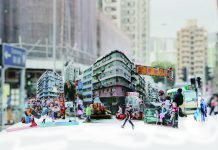Wong has always believed in encouraging social innovation in a district to raise residents’ sense of belonging in their community. Despite the limitations and problems of the district councils, she thinks there are also many opportunities for residents to think up new and creative solutions to problems.
She cites an example in the Central and Western District, where young people who were defeated in the district council election set up their own shadow district council. “They are self-empowered and they think they can make a change,” Wong says. “Self-empowerment means getting together and spending time discussing public issues.”
Although she is no longer a district councillor, Wong remains active in community affairs. She set up the Central Market Concern Group with friends to raise public concern over the redevelopment of the Bauhaus-style Central Market building into a shopping mall. “I am just a normal citizen, but I still care about my home and community. I think that if I don’t speak out, I will lose the chance to influence the district council, ” Wong says.
Whether residents can be self-empowered depends on their awareness of district issues, and their sense of belonging to the community. Chan Kin-man, professor of sociology at the Chinese University of Hong Kong, says such engagement in local issues is difficult to achieve in Hong Kong as people are often disconnected from their communities.
Chan says people in Hong Kong are only connected through shopping malls. Relationships are between customers and shop owners, and the customers do not interact with each other, nor do they feel they belong to the same community.
According to Chan, local communities in Hong Kong are becoming “bedroom communities” where the only time people spend in their communities is when they go home late after work.
“They just go back and sleep and will leave early in the morning for work. So why should they care about the community?” Chan asks. Hong Kong, he says, is now such a commercial city and pushes development to such extremes, that communities are destroyed.
To rebuild more closely connected communities in Hong Kong, a number of community initiated independent organisations have sprung up. They hope to use a bottom-up approach to organise community activities to build networks within the districts.
The Community Citizen Charter (CCC), set up in the aftermath of the Umbrella Movement, is one such organisation. Group spokesperson Karena Tang Yuen-sum says it hopes to gather passionate people from the community to volunteer to solve local problems and organise events.
Although the group participated in the district council elections last year, Tang thinks residents should not solely rely on the district councils to solve their problems. “When residents are able to use their own resources to help the community, this in fact increases their ownership and sense of belonging to the community,” says Tang.
One of the group’s most popular activities is book-swap festivals held in different districts in Hong Kong. So far more than a dozen have been organised and Tang says they not only help to build connections and ties between residents but are also a chance to raise their awareness of community affairs.
For example, when the group held a book-swap festival in the northeast New Territories, they also hosted a small exhibition introducing the North East New Territories New Development Areas plan for the participants and encouraged them to discuss the issue.
“This makes them realise that they can also be part of the issue, they are able to express their opinions,” says Tang. “A real community can be formed when residents have shared belief, interests and a common identity, and are willing to gather to fight for something continuously.”
Edited by Emily Man









































